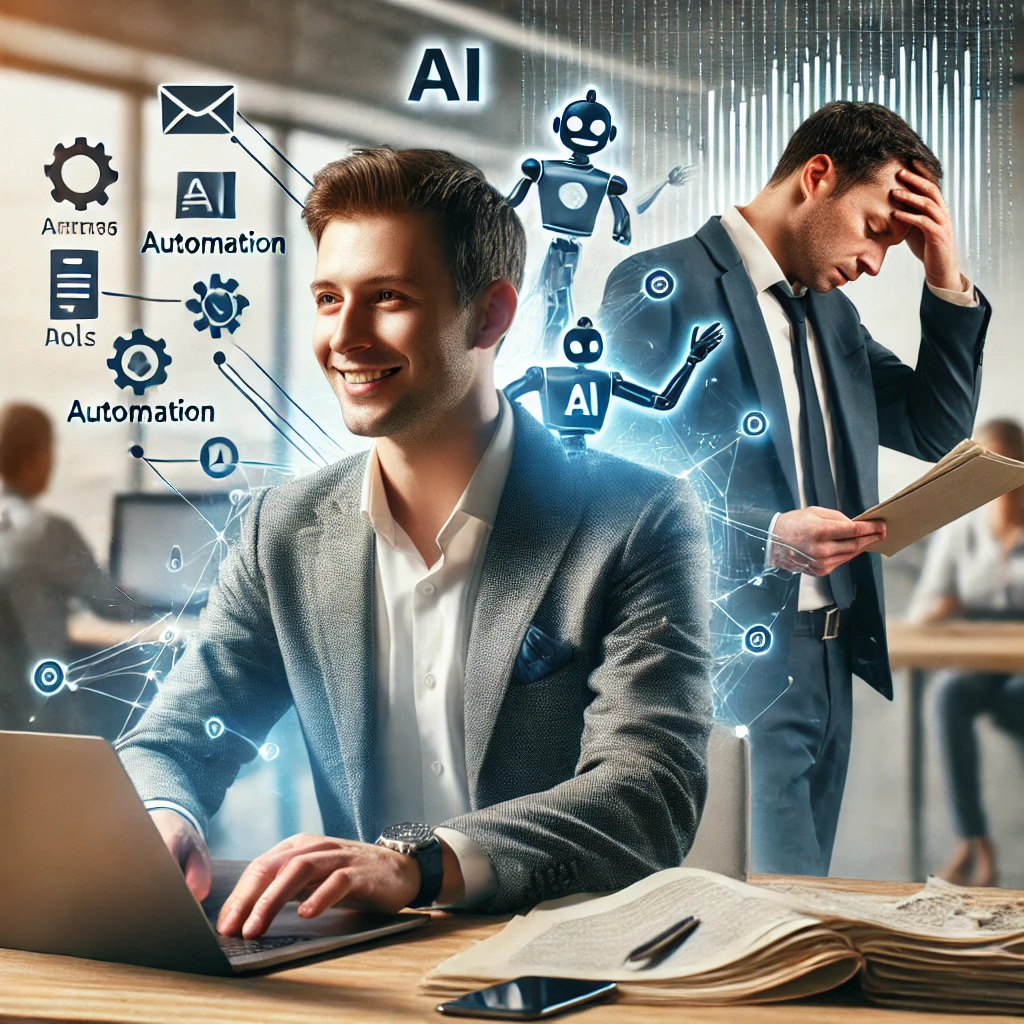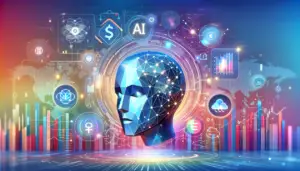Why Humans With AI Will Outperform Those Without
The integration of artificial intelligence into business operations has emerged as the defining force reshaping organizational success across every industry, fundamentally altering how companies compete and thrive in ways previously unimaginable. At Harvard Business School, groundbreaking research reveals a stark reality that’s transforming the business landscape: the fusion of human intelligence with AI capabilities will become the decisive factor in determining which companies survive and thrive in the coming decades. This shift represents not just a technological evolution, but a fundamental reimagining of how businesses operate, innovate, and create value.
We strongly recommend that you check out our guide on how to take advantage of AI in today’s passive income economy.
Table of Contents
The Evolution of AI in Business
The transformation of business through technology began three decades ago with the advent of the internet browser, which dramatically reduced information transmission costs to near zero. This revolutionary shift birthed tech giants like Google, Amazon, and Facebook, fundamentally reshaping how businesses operate and interact with customers. The impact was so profound that it created entirely new business models and destroyed countless others that failed to adapt. Looking back, we can see this moment as the first wave of digital transformation, but it was merely setting the stage for the AI revolution we’re experiencing today.
Today’s business landscape stands at a similar inflection point with generative AI, representing a historic drop in the cost of cognition itself. This transformation extends far beyond simple automation, reaching into the core of how businesses think, innovate, and make decisions. The implications are profound, affecting everything from how companies develop products to how they serve customers and manage operations. Organizations that recognize and embrace this shift are already gaining significant competitive advantages, while those that hesitate risk falling irretrievably behind.
The Learning Imperative
The digital age demands a new kind of business acumen that goes far beyond traditional management skills. Just as accounting became the universal language of business in the 20th century, understanding AI and machine learning has become essential for modern business leaders. This isn’t about becoming AI engineers or data scientists – it’s about developing the fundamental literacy needed to navigate an AI-powered business landscape. Leaders must understand enough about these technologies to make informed decisions about their implementation and to guide their organizations through the transformation process.
The necessity for continuous learning extends beyond technical skills into the realm of strategic thinking and organizational development. Leaders must cultivate a digital mindset that encompasses not just how these technologies work, but how they can be effectively deployed to transform organizations. This requires a deep understanding of both the possibilities and limitations of AI technology, as well as the human factors that determine successful implementation.
Change as a Core Competency
In this rapidly evolving landscape, change management has emerged as perhaps the most critical skill for leaders and executives. The most successful companies will be those that embed change into their organizational DNA, viewing it not as a periodic disruption but as a continuous process of evolution and improvement. This requires a fundamental shift in how organizations approach change, moving from reactive responses to proactive transformation.
The traditional model of change management, where organizations undergo periodic transformations followed by periods of stability, is becoming obsolete. Instead, successful companies are developing what might be called “continuous change capability” – the ability to constantly adapt and evolve in response to new technologies and market conditions. This means building organizational structures and cultures that are inherently flexible and adaptable, capable of absorbing and implementing new technologies and practices without disrupting core operations.
Generative AI: The Next Frontier
The emergence of generative AI represents a paradigm shift in how businesses operate, offering capabilities that were previously in the realm of science fiction. Early adopters are already discovering its transformative potential across various business functions, from content creation and customer service to product development and strategic decision-making. The technology’s ability to analyze vast amounts of data and generate human-like responses is opening new possibilities for automation and augmentation of knowledge work.
However, many organizations still grapple with how to effectively implement these tools in ways that create real value. The key lies in creating safe spaces for experimentation, running internal boot camps, and encouraging widespread adoption across all departments – not just technical teams. Success requires a balanced approach that combines technological implementation with organizational change management and skill development.
Addressing Bias and Ethical Considerations
As AI systems become more prevalent in business operations, addressing inherent biases becomes not just an ethical imperative but a business necessity. While AI can amplify existing societal biases, it also presents an unprecedented opportunity to identify and correct these biases systematically. Organizations must take a proactive approach to ensuring their AI systems promote fairness and equity, not just in their outputs but in their fundamental design and implementation.
This requires careful consideration of data representation, training methodologies, and labeling practices throughout the AI development and deployment process. Organizations must establish clear guidelines and oversight mechanisms to ensure their AI systems align with their values and ethical principles. This includes regular auditing of AI systems for bias and establishing clear processes for addressing any issues that arise.
The Future of Human-AI Collaboration
The relationship between humans and AI continues to evolve in ways that challenge our traditional understanding of work and intelligence. While current AI systems may present human-like responses through sophisticated statistical modeling, the potential for more advanced forms of AI looms on the horizon. Leading experts predict significant advances in artificial general intelligence within the next two decades, highlighting the importance of establishing ethical frameworks and responsible development practices now.
The key to successful human-AI collaboration lies in understanding the unique strengths of both human and artificial intelligence. Humans excel at creative thinking, emotional intelligence, and complex decision-making that requires nuanced understanding of context. AI, on the other hand, excels at processing vast amounts of data, identifying patterns, and performing repetitive tasks with perfect consistency. The most successful organizations will be those that find ways to combine these complementary strengths effectively.
Implementing AI Successfully
Successful AI implementation requires a comprehensive approach that goes beyond simply deploying new technology. Organizations must develop clear strategies for integrating AI into their operations while maintaining strong human oversight and ethical considerations. This includes establishing robust training programs that help employees at all levels understand and work effectively with AI tools.
Organizations must also develop clear metrics for measuring the success of their AI implementations. This goes beyond simple efficiency metrics to include measures of quality, employee satisfaction, and customer experience. Regular assessment and adjustment of AI systems ensure they continue to serve the organization’s goals effectively while maintaining alignment with ethical principles and business objectives.
Preparing for an AI-Enabled Future
The future of business success lies in effectively combining human and artificial intelligence in ways that amplify the strengths of both. Organizations must develop comprehensive strategies that embrace both the opportunities and challenges presented by AI integration. This includes creating robust frameworks for continuous learning and development, establishing clear ethical guidelines for AI implementation, and maintaining strong human oversight of AI systems.
Leaders must also focus on building organizational cultures that embrace innovation while maintaining strong ethical principles. This includes fostering environments where employees feel empowered to experiment with new technologies while maintaining a clear focus on human values and business objectives. Success in the AI age requires balancing technological advancement with human-centric values and strategic vision.
Conclusion
The integration of AI into business operations represents one of the most significant transformations in the history of commerce. Organizations that successfully navigate this transformation will gain significant competitive advantages, while those that fail to adapt risk becoming obsolete. The key to success lies not in choosing between human intelligence and artificial intelligence, but in finding effective ways to combine both.
As we move forward, the differentiator will not be access to AI technology – which will become increasingly ubiquitous – but rather how effectively organizations can leverage these tools while maintaining their human-centric values and strategic vision. The future belongs to those who can master this balance, creating organizations that are both technologically sophisticated and deeply human.

We strongly recommend that you check out our guide on how to take advantage of AI in today’s passive income economy.




